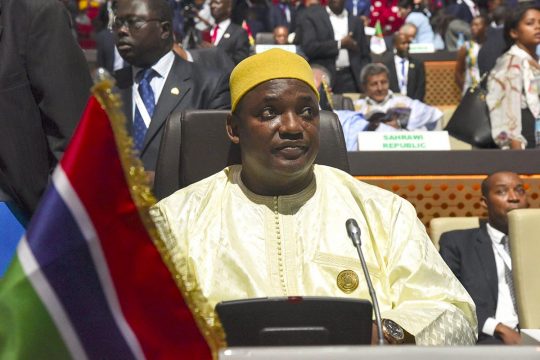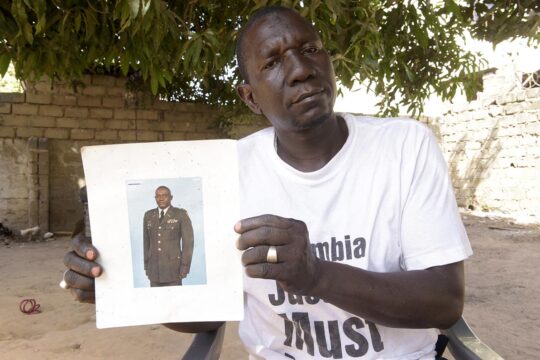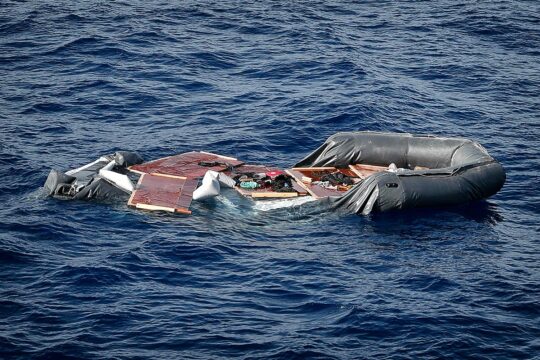More than six long years after former Gambian Interior Minister Ousman Sonko was arrested in Switzerland, he was finally indicted on April 17 for crimes against humanity. The case is being hailed as important for both Gambia and Switzerland. No date has yet been set for Sonko’s trial before the Federal Criminal Court in Bellinzona.
“It’s a long awaited moment for the victims and an important step towards justice,” said Benoit Meystre, legal advisor on this case for Swiss NGO TRIAL International which brought the original complaint to Switzerland’s Office of the Attorney General (OAG) in 2017.
TRIAL says in an April 18 press release that this is a “crucial milestone” for the transitional justice process in the Gambia, which has started to deal with atrocities committed during former dictator Yahya Jammeh’s two decades of rule, from July 1994 to January 2017. “This is also a landmark case for Switzerland, as it is only the second universal jurisdiction case to be tried by the Federal Criminal Court,” TRIAL continues, and points out that Sonko is the highest ranking individual to be prosecuted in Europe under the principle of universal jurisdiction.
Germany and the US have also launched criminal proceedings under universal jurisdiction linked to Jammeh-era atrocities in the Gambia. Gambia’s national Truth, Reconciliation and Reparations Commission, which published its report in December 2021, recommended prosecutions, among other things. But the Gambia has only conducted two related trials so far, with convictions for murder (not international crimes). Former dictator Jammeh himself remains in exile in Equatorial Guinea, where he fled after he was ousted from power.
Killings, torture, rape and illegal detention
“Sonko will be judged before an impartial and independent tribunal and we believe it will contribute to put some pressure on Equatorial Guinea to extradite [Jammeh] and that it will support the momentum around transitional justice in the Gambia,” Meystre told Justice Info. A momentum that has, in fact, largely come to a halt with the end of the hearings before the nation’s Truth Commission, the political alliance between President Barrow and Jammeh’s party, and the clear reluctance of the government to go ahead with national trials and reparations.
But Sonko’s lawyer Philippe Currat says the long procedures by Switzerland’s Office of the Attorney General were “globally unfair and to some extent irregular”, and his client plans to contest the charges on multiple grounds. Currat describes the charges as relating to “five separate, unrelated sets of events”. He confirmed to Justice Info that Sonko will plead not-guilty on all charges. Sonko has not yet seen the indictment himself, says Currat, because waiting for it to be officially translated from the original German into English.
Announcing the indictment (which it did not publish) on April 17, the Office of the Attorney General said in a press release that “the defendant is accused, in his various capacities and positions, of having supported, participated in and failed to prevent systematic and generalised attacks as part of the repression carried out by the Gambian security forces against all opponents of the regime of the President Yahya Jammeh. The charges cover a period from 2000 to 2016 and constitute in certain cases crimes against humanity” under the Swiss Criminal Code.
The OAG says it “accuses the defendant in particular of having, in the context of five events between 2000 and 2016, participated, ordered, facilitated and/or failed to prevent killings, acts of torture, acts of rape and numerous unlawful detentions”. Not all are charged as crimes against humanity.
Command responsibility
Born in January 1969, Ousman Sonko joined the Gambian Army in 1988. In 1995, a year after Jammeh came to power through a military coup, Sonko joined the State Guard, which is responsible for protecting the President, his private residence and his official residence. In May 2003, he became deputy commander of the State Guard, and its commander two months later. In December 2003, he became director of communications and was assigned to the Gambian Army Headquarters. His military career ended with his promotion to the top of the Gambia Police Force as the Inspector General (IGP), in February 2005. From November 2006 to February 2012 and from May 2012 to September 2016, Sonko held the post of Minister of Interior of The Gambia. As such, he was a member of the National Security Council, which was a high-level body on security issues. The Council was chaired by the Vice-President. In addition to the Minister of the Interior, other members included the Chief of the Armed Forces, the director of the National Intelligence Agency (NIA) and the IGP.
It is in his successive positions as a member of the army, Inspector General of the Police and Minister of the Interior, that he allegedly committed the crimes.
A particular feature of this case, says the OAG is that “the defendant's criminal liability (…) does not result solely from direct involvement in the alleged offences, but also from the responsibilities that he had in his capacity as the interior minister, as he was directly in charge of the police and of the prison service”. The accused has allegedly committed the crimes partly alone or mostly together with a collective of perpetrators consisting of Jammeh and leading members of the security forces and prison services of The Gambia. The OAG says it was part of a generalized and systematic attack against the civilian population of The Gambia, i.e. a crime against humanity.
The investigation involved “numerous interviews with the defendant, some forty interviews with complainants, persons providing information and witnesses, as well as six trips to the Gambia” under a mutual assistance agreement with the Gambian authorities.
Different sets of crimes
The crimes include the murder in 2000 of Almamo Manneh, a soldier suspected of a coup, and the repeated rape of his widow over different time periods in 2000-2002 and 2005; the illegal detention and torture of various persons in connection with a coup attempt in March 2006, members of the army, politicians and journalists; the murder in October 2011 of Baba Jobe, a former member of the National Assembly; and the violent repression of a political rally in Banjul in April 2016, including the premeditated killing of Ebrima Solo Sandeng, one of the organizers of the rally, and the illegal detention and torture of several opposition members.
The methods of torture used included beatings with fists or objects, the infliction of burns, including with melted plastic, electric shocks, cutting off the air supply by putting plastic bags over them or burying them alive, poisoning and sexual violence.
According to the indictment, Sonko would have had several telephone conversations with the IGP, who was directly subordinate to him, during the course of the 2016 events, and he was informed on a daily basis about what was happening in the prisons by the Director of Prisons, who was directly subordinate to him.
Lines of defence
Sonko’s lawyer Currat argues that procedures for witness hearings were not transparent, with some witnesses who could probably have been prepared in advance, throwing doubt on their credibility. For some of the facts alleged in the indictment, he says his client has an alibi based on documents collected by the Swiss prosecutors' investigation at the United Nations, which shows his absence from the country.
In addition, he will contest Sonko’s command responsibility, notably in the repression of the April 2016 demonstration and death of opposition leader Solo Sandeng. Those responsible were the NIA and “Junglers” hit squad, which were directly under the command of the president, and “over whom Sonko never had control or authority,” Currat told Justice Info. The charge that Sonko, as Interior Minister, should have used his command authority over the police to stop the NIA and Junglers committing crimes is a “judicial absurdity”, Currat said.
In addition, he points to the applicability of Swiss law on some of the alleged crimes, since international crimes (genocide, crimes against humanity, war crimes) were only integrated into Switzerland’s national legislation in 2011. Currat says he will also raise the proportionality and conditions of Sonko’s detention. “I know that these are international procedures with difficulties linked to cooperation with Gambia, which can explain that they are lengthy. But this has been unduly long and obviously poses the question of whether the remand period was proportional,” he said.
After more than six years of waiting for an indictment, there is still a wait for a trial date. Meystre thinks it will take a few months before the trial can start, since the investigation has taken so long and there is a lot of paper for the court to digest in preparation. Currat also does not expect it to start before October or November of this year. Sonko’s provisional detention has been prolonged until October 17, 2023.








